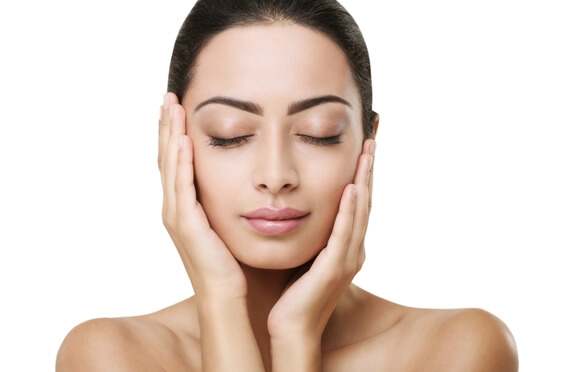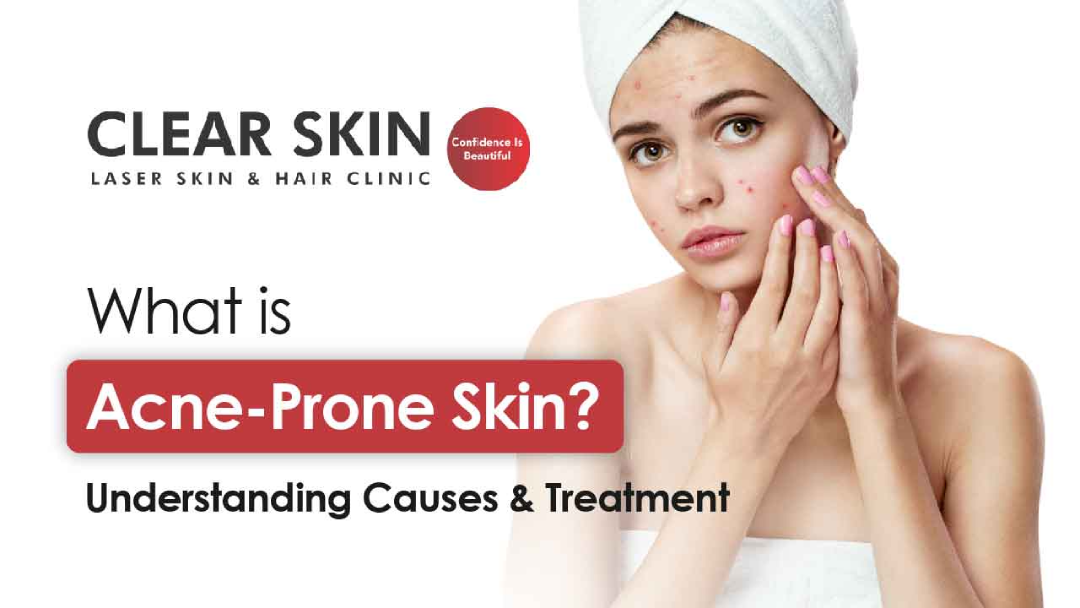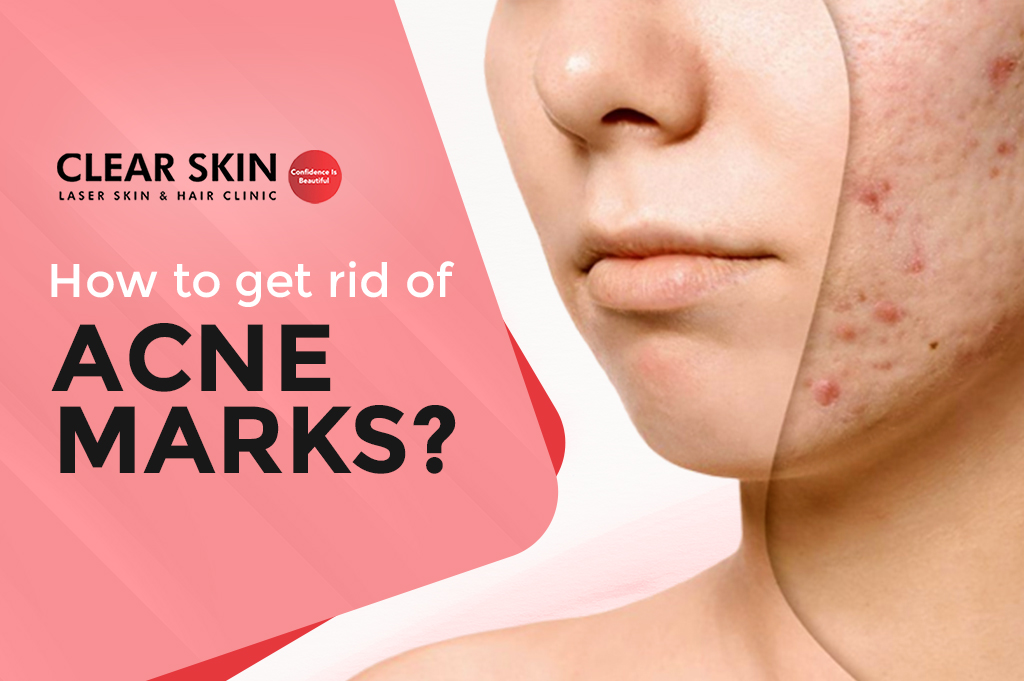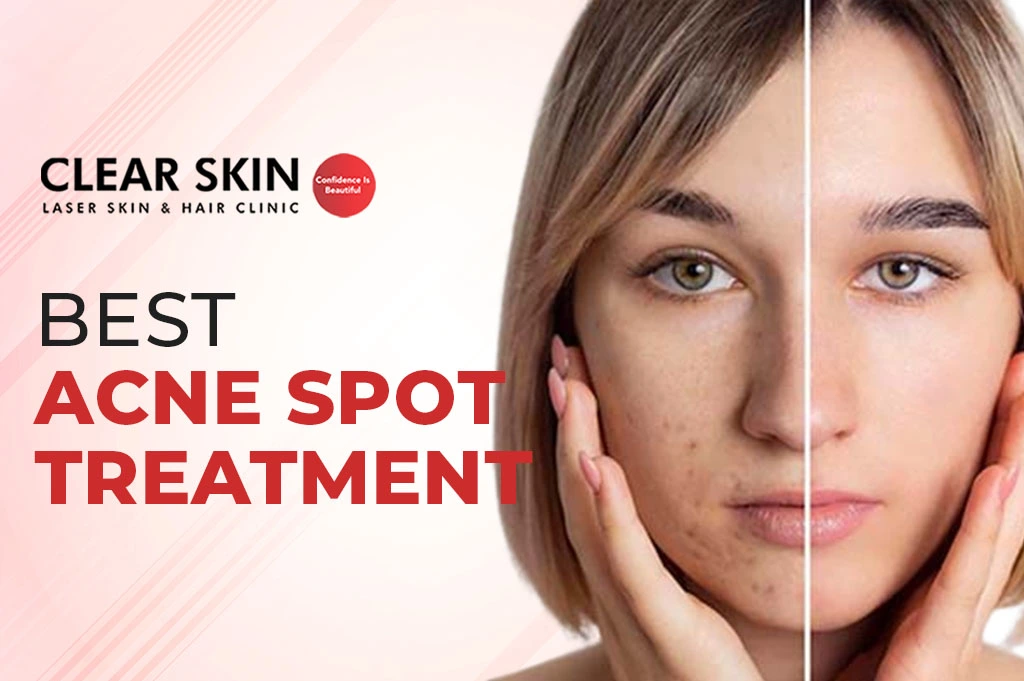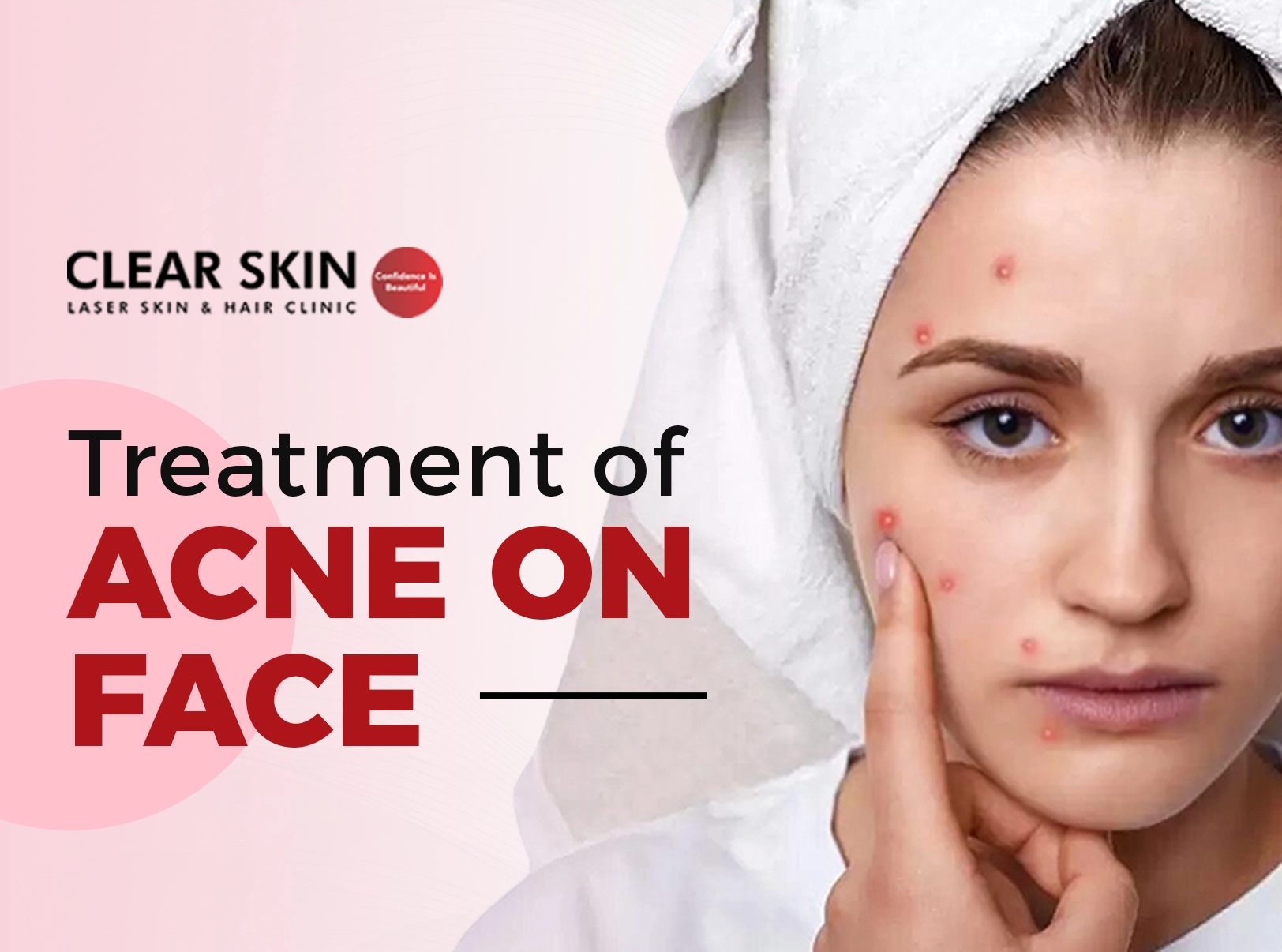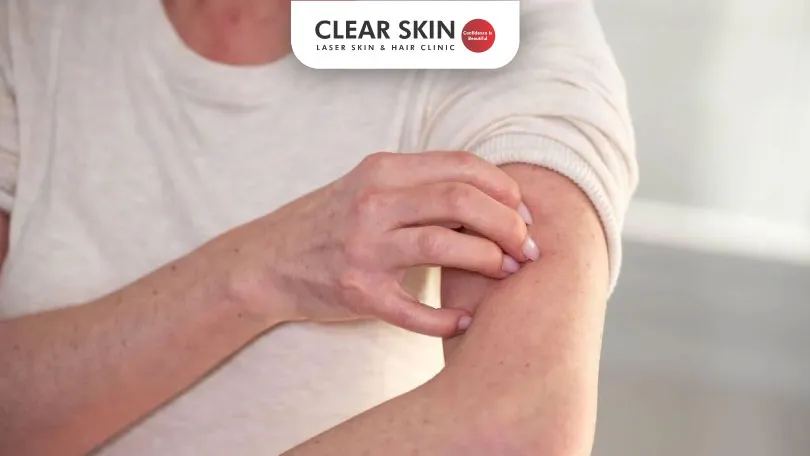Table Of Content
Acne Treatment in Pune
Acne is a chronic inflammatory disease of the pilosebaceous unit, a problem that plagues us all in our teens. Many teenagers complain of acne problems during puberty though it is not unusual for women in their mid-to-late 20s to suffer from the same. Those seeking pimple treatment complain of myriad problems, including
- Red bumps or pimples on the skin
- Clogged pores are also known as blackheads or whiteheads– Pustules or bumps containing pus
- Deep pimples and boils of cystic acne, also called cysts
In most cases, acne resolves on its own or through a combination of organic or over-the-counter medications. However, in some individuals, the skin is highly sensitive and prone to acne leading to recurring acne that may cause scarring or infections. You must consult a dermatologist for acne, a concrete solution and Acne treatment protocol if you suffer from a more severe case of recurring acne.
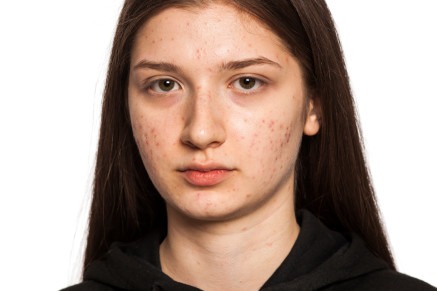
Table of Contents
Different Methods of Acne Treatment
Medical Procedures for Acne Treatment
How much will Acne Treatment Cost in Pune?
Signs and Symptoms of Acne
- Acne may cause whiteheads due to closed, clogged pores of the skin.
- The other common symptom of acne is the appearance of blackheads on the skin, which are caused by open, clogged pores.
- The appearance of small, red bumps is one of the common pimple symptoms.
- Pustules containing pus are among the most prominent signs of acne.
- Acne may also lead to painful lumps under the skin in the form of nodules or cystic lesions.
- Non-inflamed and inflamed blemishes are also a symptom of acne.
- There are two types of acne, inflamed and non-inflamed. The symptoms of non-inflamed acne include bumps and an uneven skin texture. This kind of acne causes blackheads, milia, closed comedones, and micro comedones. The signs of inflamed acne included red swollen pimples. This type of acne also causes papules and pustules.
Causes of Pimples and Acne
- One of the leading causes of acne and pimples on face is the generation of excess sebum (oil).
- Hair follicles get clogged by oil and dead skin cells, leading to acne.
- Bacteria can cause acne and pimples.
- Hormonal changes during puberty and midlife can lead to acne breakouts.
- What are the causes of pimples on the cheeks and chin? Bacteria that spread due to objects like pillow covers can cause pimples on the cheeks and chin. Certain skin care products may also cause acne on the face.
- Environmental pollution is another leading cause of acne and pimples.
- Medicines with ingredients like corticosteroids, lithium, and testosterone can result in acne and pimples.
- Excess intake of carbohydrate-rich foods can trigger acne and pimples.
- Stress is a leading cause of acne.
Pimples treatment includes home remedies like cleansing the affected skin, protecting the skin from sunlight, and avoiding picking at the pimples. OTC medicines like pimple removal cream and gels can also help cure acne and pimples. Topical retinoids and antibiotics are some other promising treatments for pimples. However, based on the severity of your skin condition, it is advisable to consult a dermatologist to seek the best pimple treatment and restore your skin health.
Different Methods of Acne Treatment
- Oral antibiotics
- Topical treatments in the form of creams, lotions, or face washes
- Medical procedures like chemical peels, lasers, and light therapies
These treatments can be prescribed individually or combined and can help
- Control further acne growth
- Avoid scars or marks on the skin from acne growth
- Make scars less noticeable
Topical Medications for Acne
In case of acne treatment, dermatologists prescribe topical acne agents, including creams, gels, lotions, and other face washes used on the skin. These topical medications help to reduce the skin's oiliness by reducing sebum production, then reduce the formation of blackheads and whiteheads, inflammation of acne, and promote the skin to peel off.
Topical treatments: Who should try this
Dermatologists often recommend topical medications to individuals who have signs of acne or suffer from mild to severe acne. These Acne treatment options help ease their symptoms, prevent scarring, and prevent the growth of acne-causing bacteria, Propionibacterium acnes. Additionally, they also keep pores clear and reduce the number of comedones. In the case of mild to moderate acne, when there are 2-3 occasional acne, these can be used as spot acne treatment.
The common topical medications used to treat acne are:
Antibiotics , Antibacterials & Antimicrobial
Topical antibiotics are mostly available as creams or gels for direct application on the skin. These antibiotic creams reduce red, painful, and pus-containing acne growth by killing the bacteria on the skin and reducing inflammation. They can be prescribed topical anti-acne creams such as benzoyl peroxide, retinoic acids, azelaic acids, etc., which further help reduce redness and pigmentation. The commonly advised antibiotics include clindamycin and erythromycin. Both these antibiotics are available as lotions, gels, and saturated pads.
Dapsone
This medication is found in gel form and is suggested as one of the best acne treatments in Pune for all age groups. Dapsone 5% gel is a first-line drug effective in treating mild to moderately severe acne. This gel is applied once or twice daily on the skin to slow bacterial growth and reduce inflammation. Topical dapsone 5% gel can be used safely and effectively for long-term acne maintenance treatment without the risk of developing antibiotic resistance. Studies show that it takes up to 12 weeks to get good results and can be combined with other topical or oral anti-acne medicine.
Retinoids
These are recommended in patients with mild to moderate acne problems. Retinoids contain compounds like adapalene and tretinoin and are available as gels, ointments, creams, or foams for application on the skin to prevent black and whiteheads. The medicinal effect of the cream pushes out the dead skin cells, thus, giving way to new cell formation. The new cells multiply to push out the dead cells and excess oil from blocked pores, thus, treating the acne problem.
Oral Medications
Though topical medications available as acne cream treatment are the first line of defence against common acne problems, to provide long-term improvement, dermatologists prefer to prescribe oral medications in case of persisting acne problems. The commonly prescribed oral medications include the group of tetracyclines (minocycline, doxycycline) and macrolides (erythromycin, azithromycin).
Oral antibiotics: Who should try this
Oral antibiotics are primarily suggested to individuals who suffer from inflamed, pustular, or nodulocystic acne or when your acne is moderate to severe and can leave scars. Best suited for mild acne (in the form of topical medication), one can also intake oral antibiotics as capsules/tablets when one suffers from moderate or severe acne. Experts recommend taking antibiotics in high doses, but it's vital to reduce the quantity once your acne starts getting better.
Combined Oral Contraceptives
Combined contraceptives, or those that contain both progestin and oestrogen, are usually prescribed to adolescents and adult women. Usually, these medicines take longer to act, so doctors prescribe them with other acne medications for quick results.
The medicinal effect of these pills reduces androgen circulation, thus, having an alleviating effect on sebum production. The combination of progestin and oestrogen acts as effective protection against acne growth.
Spironolactone
This drug is best recommended for women and teenage girls afflicted with lingering acne problems despite previous acne treatments with topical and combined oral contraceptive medications. This anti-androgen agent blocks the impact of androgen hormone on the sebaceous glands to reduce oil production and thus control acne growth.
Isotretinoin
Isotretinoin is one of the drugs that target all primary causal factors of acne; however, it may cause adverse effects. Oral isotretinoin is highly effective but can only be prescribed by dermatologists. It is mainly preferred in moderate to severe grade acne but can be given in mild grade acne when it is recurrent. It is strictly contraindicated in women trying to start a family or pregnant women.
Medical Procedures for Acne Treatment
In certain cases, acne cream treatments,oral medications, or a combination of both fail to deliver the desired results to treat acne problems. In such cases, more advanced medical procedures are prescribed to resolve acne problems.
Medical procedures: Who should try this
Medical procedures like chemical peels and laser therapies are some of the best acne treatment options suitable for individuals suffering from acne with blackheads and whiteheads or associated pigmentation of old acne. Laser therapies help to treat deep-seated acne, inflammatory, active acne, and acne scarring. As per dermatologists, light therapy (blue light/red light or phototherapy) is popular since it's safe for people and is relatively free of side effects.
Intralesional injections
Intralesional corticosteroid injections are prescribed for those suffering from severe acne associated with nodules and cysts. Steroid solution is injected into the nodule to target inflamed lesions, which helps resolve nodules or cysts quickly. An intralesional steroid injection involves a corticosteroid such as triamcinolone acetonide injected directly into a lesion on or immediately below the skin.
Chemical peels
Chemical peel treatment is an exfoliation technique that reduces blackheads, whiteheads, and pus-filled pimples using salicylic acid or concentrated glycolic acid derived from sugarcane. The peels strip away the upper dead layers on the skin's surface. Removing the superficial layers stimulates new skin growth and eliminates clogged pores.

Laser or light-based therapies
This acne laser treatment reduces bacterial growth, inflammation, skin redness, and subsequent scarring and discoloration. Light therapies used for dermatological treatment target the acne-causing bacteria in the affected area using handheld devices or large panels fitted with long, thin light bulbs to emit light and reduce inflammation.
The dermatologist decides the ideal light source and parameters depending on the severity of the acne problem. These acne laser treatment for pimples helps to avoid bacterial multiplication, reduces inflammation, promotes healing of acne, and reduces chances of scar formation.
Extraction Treatment
Dermatologists strictly advise against squeezing the pus out from the pimple or trying to remove the blemish with nails. However, when performed with the use of sterilised equipment, it can prevent acne growth. The dermatologists ensure no scarring is involved and prescribe added treatment options to prevent further acne breakout.
How much will Acne Treatment Cost in Pune?
Clear Skin clinic leading the top acne treatment in Pune at affordable costs due to its effective and innovative pimple treatment procedures that reduce acne faster and give long-term improvement.
Patients suffering from lingering acne problems can consult Clear skin to avail services of the best dermatologist in Pune for acne. Procedures such as laser treatment for pimples, chemical peels, light therapy, and more can be availed at affordable and accessible price points.
Why choose Clear skin?
Over-the-counter acne treatments fail to address the root cause of it, which is your skin health. Your acne will recur unless a proper diagnosis and tailored treatment plan are in place. We help you understand what works for your skin and comprehensively investigate your skin problems before commencing treatment. Our aesthetic solutions help you create a great first impression by controlling your acne.
For more information about laser treatment for acne in Pune, you may contact our expert team directly.
Book Appointment
Acne Treatments
Acne & Pimple Treatment Success Stories

Why let acne ruin your confidence? Treat it with experts. Visit Clear Skin for a comprehensive consultation. We've treated lakhs of patients to date and delivered positive acne treatment results. Take a look at our acne before after photos and some acne treatment success stories to be assured about our experience, expertise and credibility.
It works,
Says our Patients

Archana Kudale
"The doctors were friendly and helpful during consultation. I am taking treatment here for severe acne and the outcome is really amazing...the procedure is bit time taking"

Shrikant Talegaonkar
"Thanks to all clinic staff I felt I must write in to praise the care and kindness I received from all the doctors.. I started my Clear Skin journey 3 months ago"

Sachin Shiraskar
"Well the results were very clearly visible and my skin tone also got brighter than before. It took about 5 checkups after which acne got significantly reduced. I'm happy with the results."

Nishad Jadhav
"I was suffering from acne vulgaris, I couldn't even touch my face properly due to the inflammation. After just the first month I was seeing changes in my skin. "
Treatment Timeline








































Clear Skin Ultimate Guides
What is Acne-Prone Skin? Understanding Causes & Treatments
Discovering Flawless Skin: How to get rid of Acne Marks?
Unveiling the Best Acne Spot Treatment: Say Goodbye to Acne Spots
Effective Treatment of Acne on Face: Your Guide to Clearer Skin
Clear Skin Insights
Non-Surgical Breast Reduction: Approaches for Smaller Breasts
How to Cope With Itchy Skin After Laser Hair Removal?
How to Get Smaller Breasts in 1 Week: Effective Tips and Strategies
Hydra Facial Treatment, Procedure & Why it is popular? | Clear Skin, Pune
FAQs
While undergoing acne treatment, you must avoid using products, including facial scrubs, masks, and astringents. They irritate the skin and can worsen acne. Also, one must avoid excessive washing and scrubbing to avoid skin irritation. Besides, avoid using any creams on the face. Consult a dermatologist before use.
Acne is a common occurrence in girls from ages 14 to 28. The time when acne disappears varies from person to person. However, in most cases, acne disappears in the mid-20s. Although in some ladies, acne keeps recurring and disappearing due to various factors.
In most cases, acne disappears on its own at the end of puberty. But in some cases, it may persist during the individual’s adulthood. Based on the dermatologist’s prescription, severe cases require laser treatment for active acne and for pigmentation post acne.
Acne’s last stage is Stage 4, which features severe acne. During this stage, acne can become extremely painful, and the person may suffer from nodules, papules, cysts, and pustules across the affected area. This grade lands up in severe scarring that becomes difficult to treat.
Permanent scarring can develop if you try to pick at or squeeze your acne rather than treating it or letting it heal on its own.
Acne can be avoided. Here are some tips to avoid acne from Clear Skin, the best doctor for acne treatment in Pune.
- Maintaining a clean skin
- Avoiding exposure to the sun
- Exercising daily
- Following a balanced diet
- Keeping the skin moisturized by using correct products for acne prone skin
In many cases, heredity is the reason for acne vulnerability. But other conditions like stress, lack of sleep, diet, dehydration, smoking, hormonal imbalance, etc., can also cause acne.
Acne and pimples result from increased sweating and sebaceous glands in the skin. In adolescence, the secretions of sweat and sebaceous glands are very active. They begin producing extra sebum, which clogs the pores with sebum, resulting in acne and pimples.
It is inflammation that causes pain. When one of the pores gets blocked with excess oil or bacteria, your immune system usually responds with inflammation to cure the problem.
Threading involves pulling the hair out from the follicle root. Pulling the hair opens the pore. If the area isn’t clean, bacteria can enter the pore, clog it and lead to a breakout.
After shaving, hair follicles can remain stuck in the skin due to the clogged pore and cause a red bump. But in addition to red bumps, the person may also experience itchiness, tenderness, and a burning sensation on the skin due to the infection around the hair follicle.
Usually, pimples last for about three to six or seven days if taken with proper consultation from a dermatologist. But deep pimples may take a few weeks to disappear.
There’s a range of food you must avoid to prevent pimples. Some of them include potato chips, dairy products, chocolates, sweets, white bread, doughnuts, pastries, fries, and puffed rice can lead to pimples.
It depends upon the case’s complexity, the number of sessions, etc. But the average cost per session is Rs. 2000 to Rs. 6000. For the most specific and the best acne treatment in Pune, connect with a dermatologist.
As you hit puberty, it’s seen that acne is one of the common problems suffered by all girls. Acne problems are suffered by 85% of teenagers and are common across both genders. Teenagers struggle hard to look pretty and fair and hence knowing how to get rid of acne holds importance for them.
The best workaround to resolve acne issues is to consult your doctor who would examine your skin type and based on it, will define what treatment option works best in your favor.
Dermatologists recommend topical solutions at first to rid your skin of excess oil and acne problems. It is only after prolonged problems that doctors recommend oral medications after asking their patients to go through multiple tests for hormones and learn about underlying factors possibly responsible for acne and pimple problems. Light-based therapies and extraction treatments are viewed in extreme cases when the patient responds to neither cream-based applications nor oral medicines.
Far from causing acne, birth control pills can be one of the effective ways to control acne. These birth control pills work amazingly in some females who are suffering from acne due to hormonal issues. These birth control pills consist of estrogen & progesterone. These hormones counteract the androgen (male hormone) present in the body which is responsible for causing acne.
Hormonal acne treatment depends on the severity of the condition. In milder cases, retinoid creams and gels which are available over the counter will work. In cases of severe acne, an antibiotic may be prescribed, in combination with retinoid cream that helps clear up any bacteria. Do not pick at or pop your hormonal acne as it may lead to permanent scarring.
Avoid layering your face with make-up products and remember to rid your face of all the make-up before you go to sleep. Ensure that you do not use strong hair products as the quality of your hair products may also affect your skin. Keep your scalp clean and keep the hair strands away from your face.
There is no specific gene that determines whether you may get acne or not, but genetics plays an important role as a determinant of whether you are more or less prone to acne. How effectively you can combat acne is also based on your genetics. The ability of the hair follicles to resist acne is linked with heredity. You are more likely to have acne during adolescence if this skin condition runs in the family or if one of your first-degree relatives has had acne.
Hormonal changes are among the common causes of acne. During the teens, or puberty, one experiences significant hormonal fluctuations. It is also the time when the sebaceous glands generate more oil under the impact of hormones. This is why acne is more common during the teens.










